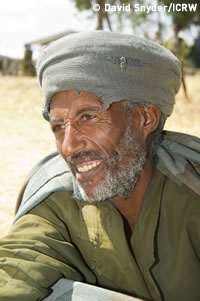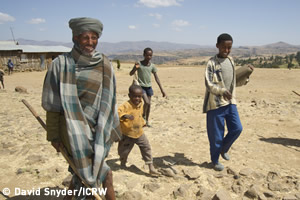
The gatekeeper
Media Contact
 It’s hard for me to forget Tesfaye Haile. A tall man with light brown eyes and a salt-and-pepper beard, he was perhaps the most animated person I met during my week in Ethiopia’s Amhara region. He smiled a lot. And even before my interpreter told me what he had said, I could tell from the inflections in his speech that he was sincere, that he believed strongly in what he was sharing with me.
It’s hard for me to forget Tesfaye Haile. A tall man with light brown eyes and a salt-and-pepper beard, he was perhaps the most animated person I met during my week in Ethiopia’s Amhara region. He smiled a lot. And even before my interpreter told me what he had said, I could tell from the inflections in his speech that he was sincere, that he believed strongly in what he was sharing with me.
Tesfaye is one of the adult “gatekeepers” in an ICRW and CARE-Ethiopia program called TESFA that works to empower child brides in two remote districts of the Amhara region. In this role, Tesfaye learns about traditional practices that are harmful to girls, including early marriage. He and other gatekeepers also are encouraged to reflect on such practices and challenged to seek alternatives to them. And finally, they spread the word – each gatekeeper visits five homes in his or her village to discuss how to create a more favorable environment for girls.
Much to ICRW researchers’ surprise, 51-year-old Tesfaye and others have also taken it upon themselves to stop early marriages in their communities.
When we met to talk about his experience with TESFA, I asked Tesfaye what he thought about these folks coming into Amhara and telling him these things about early marriage. Are these “outsiders” right?
“I saw it in my life,” he said to me. “I believe what they’re teaching.”
Tesfaye married at 18. His wife was 7 years old. They were given land as a gift. He remembers going to the fields together to work, and she would just sleep. He leans back and chuckles at the memory.
“Because I was bigger, I would hug her like a brother. She was just a child!” he says. “I used to see her more as a sister than as a wife.”
For many years, Tesfaye’s wife lived between his home and her family’s. He told me they consummated their marriage after nearly a decade, when his wife was 16. She got pregnant.
Tesfaye had been told to take her to a hospital once she went into labor. But when that day came, the family insisted against it because, he says, they were afraid doctors would operate on her. Still today, most child brides give birth at home.
I got the sense that what Tesfaye did next was against his own judgment, but that he didn’t have a say in the matter. He sided with the family, and did not take his young wife to a hospital.
She bled to death. Later, the baby died too. His daughter.
Tesfaye’s face morphed with the memory of her death. He seemed pained, even now, so many years later.
 But it’s this experience that motivates him to talk to others about the harm early marriage causes girls. It’s why he tells his story to families he visits for TESFA. “Education is better,” he says. “There’s no point in people getting married if they don’t know each other.”
But it’s this experience that motivates him to talk to others about the harm early marriage causes girls. It’s why he tells his story to families he visits for TESFA. “Education is better,” he says. “There’s no point in people getting married if they don’t know each other.”
He’s says that through TESFA he’s also come to see that women are equal to men, and in fact, women do more work than men, he told me. “Really?” I ask somewhat surprised, given that women’s contributions are often undervalued or go unnoticed in many poor communities.
“No one understood that [women] actually manage all the resources in the house to last us a year,” he says. “We thought they didn’t know anything, but now we realize they actually lead the house.”
“We also knew that they were equal and that they did more work than us,” Tesfaye said. “It was just always tradition for us to have power over our wives. But we knew.”
Tesfaye remarried a year after his first wife died. They had been friends beforehand and were older than 18 when they wed. They chose each other.
Today the couple have two sons and two daughters, Tesfaye tells me. And then he smiles. A wide smile.
“I married the woman I love.”
